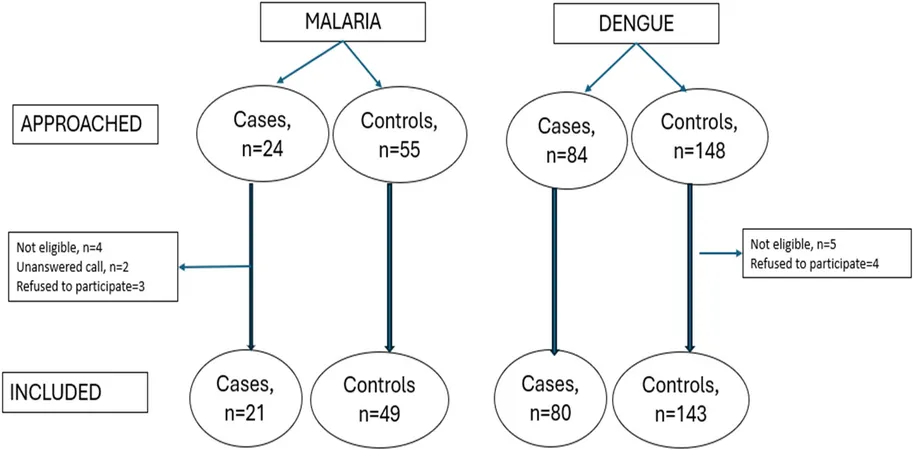
COVID-19: A Hidden Catalyst in the Severity of Malaria and Dengue? A Compelling Study from Southern India
2025-07-19
Author: Sarah
Unveiling the Connection Between COVID-19 and Vector-Borne Diseases
In a groundbreaking study from Mangalore, Southern India, researchers have explored an intriguing link between past COVID-19 infections and the severity of malaria and dengue. While we often think of these diseases as separate entities, this study dives deep into how the aftermath of COVID-19 may significantly alter the course of these prevalent illnesses.
Study Overview: The Methodology
Spanning from November 2022 to August 2024, this case-control investigation encompassed 293 adults diagnosed with either malaria or dengue. Through meticulous data collection, researchers analyzed various aspects, including demographic information, clinical symptoms, comorbidities, and prior COVID-19 infection history, charting a path to understand the implications of these intersecting infections.
Shocking Findings: COVID-19 History Fuels Severe Outcomes
The results are compelling: over 98% of dengue patients with a history of COVID-19 faced severe manifestations, compared to just 16.5% of those who did not. Similarly, a staggering 85.7% of malaria patients with past COVID-19 infections developed severe disease. The statistical significance here is hard to ignore, highlighting a potential role for COVID-19 as a catalyst in worsening these vector-borne diseases.
Demographic Insights: Age, Gender, and Socioeconomic Factors Matter
The mean age of participants was about 36.7 years, with older individuals showing heightened susceptibility. Notably, males represented a large majority of cases, and those from lower socioeconomic classes experienced a greater severity of dengue. This pattern paints a daunting picture of how intersecting vulnerabilities may amplify health risks.
Clinical Picture: Symptoms Galore!
Fever was universal among participants, but symptoms varied: headaches, chills, and other manifestations revealed the complex clinical landscape of these infections. Complications also emerged, with severe malaria patients presenting hyperparasitemia and those with severe dengue facing thrombocytopenia.
The Bigger Picture: An Inextricable Link between COVID-19 and Vector-Borne Diseases
This study underscores a crucial need for awareness and monitoring of malaria and dengue patients, especially those with a history of COVID-19. The implications are profound—health policies may need re-evaluation to enhance surveillance and preventative strategies in endemic regions.
Conclusions and Future Directions
In essence, past COVID-19 infections appear to be more than just a footnote in the medical history of these patients—they may be central to understanding the severity of malaria and dengue. As the world gradually recovers from the pandemic, the intersection of these diseases demands further investigation, not just to protect individual patients, but also to safeguard communities at large.
 Brasil (PT)
Brasil (PT)
 Canada (EN)
Canada (EN)
 Chile (ES)
Chile (ES)
 Česko (CS)
Česko (CS)
 대한민국 (KO)
대한민국 (KO)
 España (ES)
España (ES)
 France (FR)
France (FR)
 Hong Kong (EN)
Hong Kong (EN)
 Italia (IT)
Italia (IT)
 日本 (JA)
日本 (JA)
 Magyarország (HU)
Magyarország (HU)
 Norge (NO)
Norge (NO)
 Polska (PL)
Polska (PL)
 Schweiz (DE)
Schweiz (DE)
 Singapore (EN)
Singapore (EN)
 Sverige (SV)
Sverige (SV)
 Suomi (FI)
Suomi (FI)
 Türkiye (TR)
Türkiye (TR)
 الإمارات العربية المتحدة (AR)
الإمارات العربية المتحدة (AR)